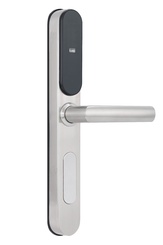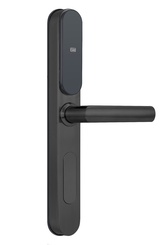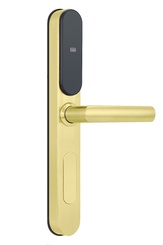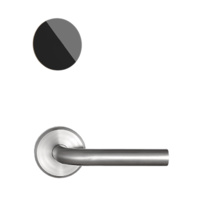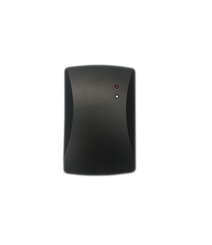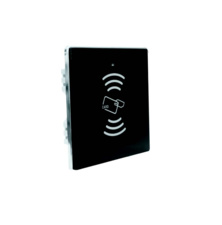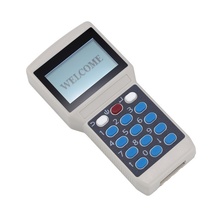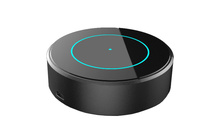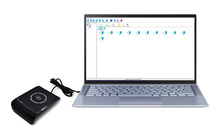RFID hotel locks
Traditional door locking is still popular, but there are innovative solutions that provide not only a modern look, but above all, comfort and safety. They are used in buildings of public institutions, companies, hotels, as well as in private homes. These include card locks, code handles and one-key systems such as MASTER KEY.
Effective closing
The lock is the optimal solution when it comes to simplicity, as well as ease and speed of operation. The locks available in this category operate with a proximity RFID card. It is a passive card that does not emit a signal, but an appropriate reader is required to open a given room using such a card.
Different solutions for different objects
By using card locks, we not only have control over the rooms we rent for guests, but also over offices, sports fields, and other sports and commercial facilities. We can remotely enable entry to, for example, sports fields or tennis courts, when one of the devices we offer is installed on the gate to these facilities. Bluetooth locks for external entrance doors, whose readers are resistant to weather conditions, will prove useful here.
In turn, for houses for rent, a Wi-Fi door lock will work, as other solutions are not always possible. Such special coded handles are made of special materials that are resistant to weather conditions.
Opening with a card is always practical
A solution that customers of hotels, guesthouses, as well as employees of various institutions are accustomed to is a hotel lock for a card. This is an effective and effective solution. Using the card, we can not only open the room and entrance doors, but also turn on, for example, air conditioning or lighting. The advantage here is that no special software or applications are required. Additionally, by installing a card lock, it does not require additional investments. It can be installed on a variety of doors, and the process doesn't take much time or cost. The card lock is easy to use and reliable. Operations are signaled acoustically and visually. Additionally, it works for a long time without replacing the battery.
One key to everything
Are you looking for a solution that will allow you to open only those rooms to which the owner has permission? The MASTERKEY one-key system is the answer - it opens one, several or all rooms. Convenience, flexibility, ease of access control and universality are the main advantages of this solution. For proper operation of the system, it is enough to perform the appropriate key plan. MASTERKEY will then work in many places - in large companies and institutions, but also in medium and small establishments, homes, hotels, guesthouses, and even on ships. Importantly, such locks work with existing doors, so there is no need to replace them. They can be mounted not only on doors inside the building, but also outside.
Hotel locks and their use in hotels and apartments
The electronic hotel lock system is a convenient and modern way of granting access to multiple rooms. Only the hotel card can open individual aisles. The reception desk decides where and for how long the hotel guest will have access. Cards are difficult to copy, unlike a mechanical key, which gives a high degree of security. If the card is lost or stolen, it is enough to block the lock with a blocking card or issue another card to the same users with the "replace old card" function. By comparison, the loss of a mechanical key exposes the user to costly cylinder replacement. In case of losing cards, it just seems to be the next available one. In addition, you do not need to replace the lock, and the cost of a new card itself is much lower than replacing the cylinder.
Electronic hotel locks are now standard in all hotels around the world. From a psychological point of view, security is synonymous with comfort and convenience for hotel guests. For a hotel guest, during the rental period it is 'his' room, belonging only to him, in which the guest wants to feel comfortable and safe. Modern hotel locks not only give this guarantee, but also increase the prestige of the hotel, improving the convenience of service both for guests and reception. In addition, current technologies allow the integration of hotel lock systems with other systems, such as BMS - building management system, hotel and catering programs to support entire facilities or access control systems. The hotel card can cover the entrance to the building, the elevator, the Wellness & Spa area or the entrance to the swimming pool. There are many possibilities, you just have to ask yourself how much do we want to expand the system and what do we really need?
For years, we have been dealing with the distribution and implementation of security systems using electronic hotel locks. Over 500 hotels in Poland and abroad have already benefited from our experience. The hotel locks we offer can work both offline and online. Our priority is to meet the needs of customers, which is why we implement security systems tailored to individual customer requirements.
Division of hotel locks
Electronic locks can be shared in several ways
1) Offline hotel locks, online hotel locks, WiFi hotel locks - bluetooth locks
2) Type of card / transponder and method of its / its reading (magnetic, chip, proximity, etc.)
3) Type of fittings (full locks, hotel overlay locks, divided signs, signs embedded in the leaf)
4) Type of technology used (card locks, code locks, fingerprint locks, etc.)
The division of locks into the type of signboards from the second point is an additional issue, sometimes conditioned by the investor's individual vision, and sometimes by technical requirements. On the other hand, code or fingerprint locks are the perfect complement to the entire system, securing, for example, passages to warehouses, offices or server rooms. Therefore, let me discuss only the first and the second point in more detail, because that is the main topic of this article.
Over the course of 10-15 years, a wide variety of hotel lock technologies have been used. I will try to briefly describe each of them, listing their advantages and disadvantages.
Offline hotel locks
It is a classic system of locks mounted on the door leaves, requiring no wiring. The hotel lock is powered by alkaline batteries with a service life of approx. 2 years. They have emergency opening with the key included in the set. It is characterized by simple installation and ease of use. The information is transferred between the computer and the lock by means of a card. This means that in order to set the settings on the castle or read data from it, you must approach it and physically approach the card each time. Such a system includes hotel locks, card programmer, software, hotel cards.
Online hotel locks
On-Line systems are systems that are still rarely used on the Polish market, therefore they require a greater financial outlay and require a previously prepared infrastructure. The system consists of wall readers mounted on each door. Then, a fixed handrail from the corridor side and a door handle from the room side are mounted on the door. The readers are connected via structured cabling to the control panel, power supplies and further to the reception desk. It is a more complicated system in the construction itself, but a number of its advantages mean that hotels are increasingly turning to this type of solution. First of all, the locks are powered by direct current from special buffer power supplies, which means that you do not have to replace the batteries - the lock always works. Secondly, we have a continuous connection with the lock and full view of events, which means that we can grant authorization on an ongoing basis, remotely control the entrance to the room and monitor the technical condition or read all events without leaving the reception desk.
WiFi hotel locks - bluetooth locks
This is currently the most promising direction in the development of hotel locks. In fact, it is in a sense a combination of both of the above-mentioned systems. Classic hotel locks are mounted on the door (no wiring required), which connect via radio at selected moments with the controller installed, for example, on each floor. These controllers already communicate by cable with the headquarters and reception. WiFi hotel locks combine all the advantages of the above-mentioned systems, because the data from the locks enter the computer on a regular basis, but at the same time there is no need to put cables to each door. In addition, the locks can work with a card, code and bluetooth application. The main advantage of this system is the remote granting of authorizations without the need to run a reception, which is why these systems are now increasingly used in hotels and apart-hotels.
Hotel locks in the past:
Locks for perforated cards
One of the first systems that hardly anyone remembers. In Poland, it is rarely used, mainly in prestigious chain hotels at the turn of the 80's and 90's of the last century. On the paper or plastic card - small holes were made, creating their own individual pattern. It was in the shape of old bus tickets with holes used not so long ago. This solution was one of the first, so it was quite a challenge for both the producer and the hotels. The system significantly improved security and guest service, increased the prestige of the hotel, but it also had its drawbacks. The card was disposable, often broke, and their size was too large to keep, for example, in a wallet.
Magnetic card locks
Magnetic card lock - probably the most popular and the longest used locks in Poland since the 90s. The data carrier was a magnetic strip (cassette tapes and VHS video tapes used to have a similar effect). Data from the card was read by inserting or swiping the card with the appropriate side through the reader on the lock. Similar solutions led the way in banking payment systems, however, they have already been replaced by newer ones. The advantage of these locks was the low cost of the magnetic card itself, then ranging from 0.80 PLN to 3.00 PLN depending on the type of strip and the method of their printing. They also had a lot of disadvantages. The main one was the degaussing of cards by bringing them closer to a magnetic element or even to a mobile phone. Guests often returned with a broken card moments after it was displayed at the reception. The magnetic card lock had one more significant drawback - the fact that the card had to physically touch the reader. The abrasive contact had a negative effect on both the card and the reader itself. After some time, the card was discarded and the reader needed to be repaired. Over time, readers, or rather magnetic heads, became more and more expensive. Newer solutions began to slowly displace the emergency magnetic technology.
Chip card locks
There is a contact element on the card, the so-called Chip with EEPROM memory. Chip cards are much more durable and much safer than magnetic cards. The chip technology provides a strong authentication mechanism as it uses cryptographic based identification. The principle of reading is similar to that of magnetic cards. Insert the card into the lock slot with the appropriate side, hold it for a while until the reader reads the data from the card. This technology quickly replaced magnetic strips in both access control systems, e-banking and industry. Here, however, there is the same problem of physical contact of the chip with the reader of the lock. Chips and read heads wear out during long-term use. It turned out that replacing the lock head often exceeds the cost of a new lock, e.g. in the newer RFID technology. This solution, however, works to this day in mobile phone systems (SIM cards), but there the reader and the card are permanently attached to each other - there is no abrasion of both elements.
Dallas chip locks
The Dallas chip is a small transponder in the form of a key ring with a metal ending. Mainly used in On-Line systems. It is a passive medium, which means that apart from its individual card number, it cannot store any other data on it. A solution that is rarely used on the Polish market, as On-Line systems in hotels have only recently entered our market. Another disadvantage of this system was the reading itself. There is only a small contact point in the castle where you have to 'hit'. This can be troublesome for the elderly, disabled or visually impaired.
Current and future solutions:
Locks for proximity cards
Locks for proximity cards are currently the most popular solution. The proximity technology, called RFID (radio frequency identification) for short, most often uses Mifare cards with a frequency of 13.56 MHz. The operation of the hotel card is contactless. By bringing the hotel card closer to the reader, 1-3 cm from the lock, the lock reads the rights from the card via radio. Lack of physical contact extends the life of the lock and the card itself. You can put any graphics on the hotel card that will not wear off during use. This technology has many advantages. The most important of them is a high level of data security combined with the possibility of integrating locks and cards with other systems in the hotel. This means that one hotel card can serve the parking gate, main entrance to the hotel, elevator, room, safe, spa, etc. The disadvantage of the system is that the cards cannot be punctured. A few years ago, cards were quite expensive, now that has changed and you can get a printed RFID card for 4.00 - 8.00 PLN net. Often, however, lock manufacturers reserve the right to operate the locks only with their cards.
NFC hotel locks
This is a fairly new technology used in payment systems and access control systems. NFC (near field communiction) is a short-range, high-frequency, radio communication standard that allows wireless data exchange up to 20 centimeters. Today, most modern cell phones have a built-in NFC module. Currently, it is mainly used for payments - bringing the phone closer to the terminal instead of the card. However, it is increasingly used in hotel lock systems. During registration, the guest does not receive a separate card for the room - all data and permissions are sent to the smartphone. The lock operation, as in the case of the proximity card, is contactless. Often, the locks that operate in the NFC technology work evenly in the proximity card system. This dual system is easy to use and offers a high degree of safety. The disadvantage of such readers is the high power consumption during device operation. This technology is developing very quickly, but is slowly being replaced by Bluetooth locks.
Locks for QR codes
QR codes (QR Code or Quick Response Code) are barcodes that allow you to save a large amount of data. The amount of data that can be written in one code is variable. For alphanumeric characters, it is 4,296 characters. It is an alphanumeric, two-dimensional, matrix, square bar code invented by the Japanese company Denso-Wave. Currently, most phones already have QR code readers. More and more reputable manufacturers install such readers. In the case of access control and hotel locks, it is a very convenient solution. It is enough to send the code as a photo to the customer's phone number. Such a code can be a key to the door that is active at the time of the report. When entering the room, the client has to turn on the photo on the phone and hold it against the reader / scanner on the lock. After correct reading, which takes only a few milliseconds, the lock is unlocked. It is one of the newest solutions. QR codes are used more and more often in industry, advertising and medicine. Certainly, their great advantage is that such a code can be applied to virtually any carrier - a sheet of paper, a sticker, a digital carrier such as a smartphone, tablet, etc. Its disadvantage is the ease of copying the codes to another carrier.
Hotel locks on Bluetooth application
The latest technology used in hotels is Bluetooth technology. Nowadays, virtually everyone has a smartphone and uses many useful applications. Modern hotel locks use Bluetooth technology to communicate with the lock. Using dedicated applications, you can grant access by sending an electronic key to another person from virtually anywhere in the world. This greatly improves the hotel's work, as you do not need to run a classic reception desk. The hotel guest receives an e-Key, goes to the lock, clicks 'Open' and the lock is released for the selected time. At the same time, the administrator receives information about opening the lock at the same time. The system is very easy to use. The latest models of hotel locks, in addition to opening through the application, offer the possibility of opening with a proximity card, a code and, of course, an emergency with a mechanical key. These are the so-called multifunctional locks and locks are used in hotels and short-term rentals. bussines grup guest.
What additional functions, apart from opening the door, can hotel locks fulfill?
Having an electronic hotel lock system allows for comprehensive hotel management, establishing a specific order in the hierarchy of tasks and accesses for individual service groups.
For example, a floor service may have cards that support a given floor. An interesting feature of the locks is the DO NOT DISTURB function. This means that if a hotel guest locks himself in the room and turns the knob from the inside, the maid will not enter the room. The lock will issue an appropriate message defined earlier at the reception. The same applies to virtually every group for which we can grant individual permissions. For example, the technical service may have access to all rooms plus one additional lock for the technical room in which it is stationed. The IT department can only have access to the server room, etc. There can be several types of cards and their permissions:
- Lock deletion card - deletes all hotel lock settings
- Program card - assigns the lock number in the system
- Gate card - sets up common passages, such as the main entrance to the hotel
- Master card - a card that will always open all locks - for the director and people in the highest positions
- Emergency card - a card that opens individual locks in a given facility in emergency
- Blocking card - the card blocks the guest card lock
- Conference card - sets the lock to conference mode - always open door
- Date card - card for reading events from the hotel lock
- Floor card - the room card opens all locks on a given floor
- Room card - card for the room, opens all locks on the hotel
- Guest card - a card issued to the guest for the duration of his stay
- Spare card - a card issued when the guest card is lost, bringing it closer to the lock causes the removal of the old card and thus activation of the new one
Equipping a hotel with locks, what other devices are needed to fully use all their functions, with what other systems in the hotel should they be integrated?
The system of electronic hotel locks can work with any hotel program on the Polish market. This means that we make reservations, invoicing and servicing locks from one reception program.
The hotel lock system is based on Mifare proximity cards, which are compatible with many access control systems. Thanks to this, you can use one card to open the door to the room, turn on the electricity, start the elevator or a barrier in the parking lot. The same cards can be used at the pool by opening the locker or at the gate at the entrance to the slope.
Currently, a frequently used solution is to install access control readers at the main entrance. It comes in handy when the hotel does not have a 24h reception. Then such a reader positions itself in the so-called Work schedule. This means that the main door to the hotel is open, e.g. from 7-22, and then it is automatically locked. Only people with active hotel cards can enter the facility.
Another interesting and noteworthy device is a card-operated hotel switch. Hotel switches with a proximity card are a perfect complement to the electronic hotel locks system. By using one common card, you can open the door and then turn on the electricity in the room. Savings after using the switch can reach up to 20% per year.
The principle of the switch is to turn on the energy in the hotel room only after inserting the guest card into a special stand, hanging on the wall right at the entrance. The switch is illuminated, so even in the dark it is easy to find. After inserting the card, all electric circuits are switched on and the light turns on automatically. When leaving the room, the guest takes the card from the device, so that no electrical devices remain in the room (except for the refrigerator circuit). The switches have a built-in time delay, so even after removing the card, there is about 30 seconds to take the most important things and leave the room calmly. To use the switches, it is necessary to prepare the electrical installation in advance and to use special, dedicated flush-mounted boxes.
What are the most common mistakes hoteliers make when choosing locks?
There is already a fairly large selection of electronic hotel locks on the Polish market. We have a whole range of products straight from China, as well as the better companies branded with European brands. However, there are several important factors to keep in mind when choosing locks. The hotel lock is the first thing a hotel guest comes into contact with in the room. It's like the first impression of a meeting that affects everything else. Our device must always be operational, have good service and access to parts. Operation should be simple and intuitive.
First of all, you have to look at the locking system in the long term. Locks must be of good quality, the service must work quickly and efficiently, and the technical support must always answer questions in a matter-of-fact and reliable manner. This is what we expect from all other hotel facilities.
Before making a purchase, it is worth browsing the market offer. If we choose high-end locks, they should be compared only with those to which they belong. You cannot have a Mercedes at the Fiat Panda Price. If we already have several favorites, you should invite a representative of a given company to present their products professionally and professionally. It is also best to check the company's recommendation by contacting the hotels on the list of projects. If we sign a purchase and warranty agreement, let's try to negotiate fair terms for both parties. There are companies that offer up to a 10-year warranty, after drawing up an appropriate service contract. You should always look at the good quality of products and the reliability of the service of a given company - this will surely guarantee long and correct operation of the system.
